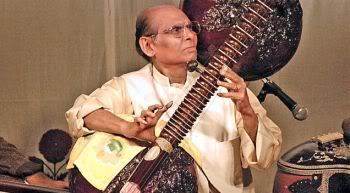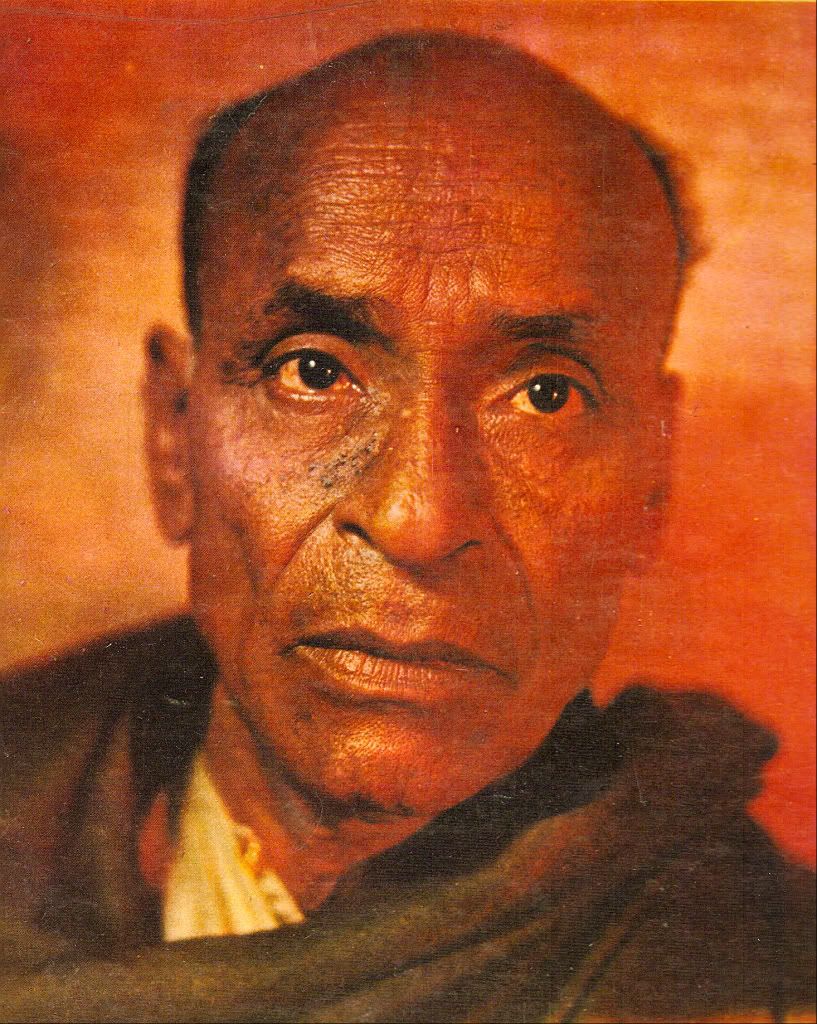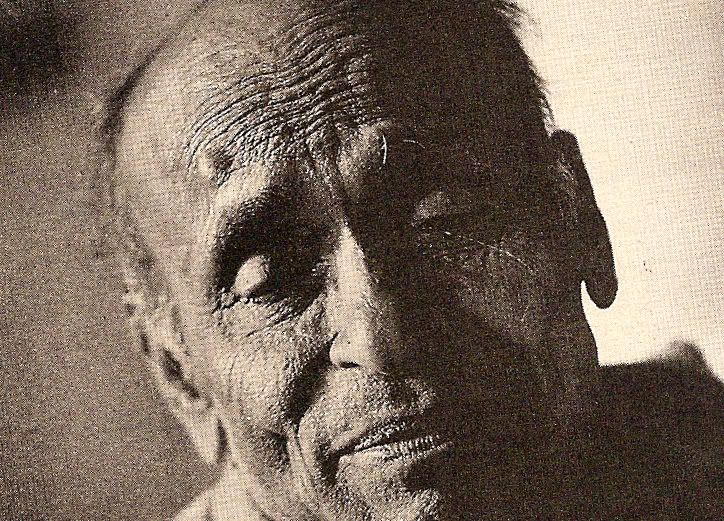India Indian music music: genius violin
by Warren
leave a comment
Meta
SiteMeter
Brighter Planet
78 rpm Records of Indian Music: Pandit V.G. Jog, with Ustad Ahmed Jan Thirakwa
Two early recordings of the late Pt. V.G. Jog, one of the musicians who made Hindustani violin a force to be reckoned with in the 20th century.
Pandit Vishnu Govind Jog, better known as V. G. Jog (22 Fehruary 1922 – 31 January 2004), was an Indian violinist. He was the foremost exponent of the violin in the Hindustani music tradition in the 20th century, and is credited for introducing this instrument into Hindustani music.
Jog was a disciple of Baba Allauddin Khan. He performed and recorded with many of the greatest Hindustani musicians of the 20th century (including Bismillah Khan) and toured the world. He frequently performed for All India Radio’s Calcutta division. He received the Padma Bhushan award in 1982.Wiki
He is accompanied by one of the greatest exponents of tabla ever known in India, the late Ustad Ahmedjan Thirakwa:
Ahmed Jan Thirakwa Khan was an Indian tabla player, commonly considered the preeminent soloist among tabla players of the 20th century, and among the most influential percussionists in the history of Indian classical music. He was known for his mastery of the fingering techniques and aesthetic values of various tabla styles, technical virtuosity, formidable stage presence, and soulful musicality. While he had command over the traditional tabla repertoire of various gharanas, he was also distinguished by the way in which he brought together these diverse compositions, his reinterpretation of traditional methods of improvisation, and his own compositions. His solo recitals were of the first to elevate the art of playing tabla solo to an art in its own right in the popular mind. His style of playing influenced many generations of tabla players.
A meeting of the titans, indeed. Enjoy these two performances, probably from the early 1950s.
This version of Raga Bahar is based around the popular chiz Phulwaale kaunt main ka basaunt, recorded in the 1920s by Narayanrao Vyas.
Raga Nat Bihag; inevitably, this is an adaptation of the canonical chiz Jhan jhan jhan payal baaje, sung by pretty damn near everybody who’s ever performed this raag.
Thirakwa is rock-solid and authoritative throughout these performances.
India Indian music music vocalists: genius khyal
by Warren
3 comments
Meta
SiteMeter
Brighter Planet
More Early Mallikarjun Mansur To Delight Your Ears
Three more gems from Buwa’s Gwalior period, for your enjoyment:
“Karnataka Kafi”
==========================================
Raga Puriya
==========================================
Raga Brindabani Sarang
India Indian music music: genius Hindustani instrumentalists Raga
by Warren
leave a comment
Meta
SiteMeter
Brighter Planet
78 rpm Records of Indian Music: Abdul Aziz Khan
I’m gradually getting more of my collection of Hindustani 78 rpm records digitized and uploaded.
Here are two performances by the vichitra veena player Abdul Aziz Khan, of the ragas Darbari Kanada and Bageshri.
On both recordings the Ustad can be heard giving himself daad when he plays something nice. It’s a fascinating look at the artist’s mind in its relation to the listeners; he needed to have rasikas enjoying his music for it to have any meaning — and since it was just him and the tabla player in the room, he provided his own feedback as needed.
More to come. I have hundreds of these recordings and I plan on getting them all uploaded in the next year or so.
Education India Indian music music Personal: aesthetics Education genius India Indian music music obituary
by Warren
2 comments
Meta
SiteMeter
Brighter Planet
A Great Tree Has Fallen: Asad Ali Khan, R.I.P.
This Tuesday, June 14, the world of music lost a great spirit.
Ustad Asad Ali Khan, one of the few remaining performers on the ancient Indian stringed instrument called the Rudra Veena, passed away after suffering a heart attack in the early hours of the morning.

He performed an austere and sober style of music, an instrumental version of the vocal style known as Dhrupad, which dates back to the 11th century or so. The Rudra Veena, or Been, is considered to be one of the oldest instruments of Indian tradition; it has its own origin myth, which states that the instrument sprang full-blown from the forehead of a meditating Lord Shiva. It is interesting that Asad Ali Khan, whose name makes his Muslim ancestry evident, saw no religious conflict in embracing this story; ecumenicism in Indian musical traditions is alive and well.
India Indian music music vocalists: genius khyal
by Warren
2 comments
Meta
SiteMeter
Brighter Planet
Mallikarjunbua Before Jaipur-Atrauli Training
Here are some more of the 78 prm discs from Mallikarjun Mansur’s early period, when he was still singing Gwalior gayaki. These recordings are utterly delightful.
Gaud Malhar:
Jaunpuri:
Kafi:
Adana:
April 22 Action environment India Indian music music
by Warren
2 comments
Meta
SiteMeter
Brighter Planet
Tara Bangalore’s Set, 04/22/2011
Here is the complete set by Carnatic violin virtuoso Tara Bangalore at the “World Violins Against Climate Change” concert in Boston on April 22. Her artistry is prodigious, and her rapport with her disciple Rasika Murali is absolutely delightful.
Personnel:
Tara Bangalore and Rasika Murali – violins;
Pravin Sitaram – mridangam;
Tarun Bangalore – kanjira and mridangam.
Listen and enjoy — and if you do, please consider donating to 350.org through this link.
Composition: “Abishta varada”
Ragam: Hamsadhwani
Adi talam- 8 beats
Composer: Tyagaraja
——————————————
“Sobhillu”
Ragam: Jaganmohini
Rupakam — 6 beats
Composed by Tyagaraja
——————————————
“Aparadhamula”
Ragam: Latangi
Adi talam
Composed by Patnam Subramania Iyer
——————————————
Thani Avartanam (Percussion Solo)
——————————————
“Tom Dru Dru Dim”
Ragam: Misra Shivaranjani
Double beat – 16 beats Adi talam
Composed by: Maharajapuram Santhanam.
——————————————
environment India: colonialism corporate irresponsibility economic inequities McGill University
by Warren
leave a comment
Meta
SiteMeter
Brighter Planet
Year 2, Month 3, Day 16: John Company Raj Redux
The Times of India runs an article on the McGill study, which had also provided fodder for yesterday’s letter. One good turn deserves another. In this letter I tried to connect the climate crisis loosely to India’s history of British colonialism.
Sent March 7:
In an ironic coda to the destructive legacy of colonialism, the McGill University study makes painfully clear the fact that those whose lives are already subject to the vagaries of climate and extreme weather will be the first and most painfully affected victims of climate change. Asia, Africa, South America and Oceania are going to bear the brunt of the destruction caused by the industrialized nations’ greenhouse emissions; countries whose “carbon footprint” is little more than a rounding error will be the ones submerged by rising seas, devastated by drought, or inundated by catastrophic flooding. A world-wide initiative to transform the energy economies of both the developed and the developing world is morally, scientifically, economically and socially essential. Alas, in a world dominated by the short-term fiscal interests of multinational corporations, a just and equitable approach to the climate crisis seems likely to remain a planetary fever dream.
Warren Senders
India Indian music music vocalists: genius Jaipur Gharana khyal
by Warren
9 comments
Meta
SiteMeter
Brighter Planet
Singing Is Nothing But Joy: An Appreciation of Mallikarjun Mansur

The first time I heard the music of Pandit Mallikarjun Mansur was in 1978, very early in my study of Hindustani music. I’d taken a survey course on Indian music at the Harvard Extension, and the professor gave me an assortment of vocal music that included Mansur’s rendition of a beautiful rainy-season raga, Gaud Malhar.
It was strikingly different from the other music on the tape. More than any of the other singers represented, this vocalist really seemed to be enjoying himself. There was a rhythmic playfulness that spoke to my jazz-loving self, integrated with the serene aesthetic flow that characterizes Hindustani music. His voice was a high, slightly raspy tenor; his range was relatively narrow; his breath control preternatural.
I asked other people about Mansur. This was the late 1970s, and most of the people I knew in the Indian music community had never heard of him; as it turns out, he had not been performing widely for decades and had only recently returned to the notice of the concertgoing public in India. Over the next few years I gradually acquired tape recordings of his LP records, whetting my appetite for more of this remarkable singer’s remarkable music. Nobody I knew on the Indian tape-trading network had any concert recordings, and the Internets hadn’t been invented yet.

humor India: commercials vanity
by Warren
1 comment
Meta
SiteMeter
Brighter Planet
Wow.
Just wow. Wildstone is apparently a brand of male body products in India. Their TV spots are clearly pushing the boundaries.
Note that according to at least one customer, it’s not entirely satisfactory stuff.
India Indian music music Personal Warren's music: concerts
by Warren
leave a comment
Meta
SiteMeter
Brighter Planet
Khyal update
The Chinmaya Center concert went well, I thought. I did a 90-minute set:
Maru Bihag: “Unhi se jaaye” in vilambit ektaal; “Kaahe bajaaye daayi ho Shyam” in tintaal; “Sun sun tori batiyaa” in drut ektaal.
Paraj: “Chandani raat ati bhaave sakhi” in tintaal.
Desh: Tarana in tintaal
Surdaas bhajan: “Ankhiyaan Hari darasan ki pyaasi”
Bhairavi thumri: “Jamuna ke teer”
Chris Pereji played tabla, George Ruckert was on harmonium and Vijaya Sundaram on tamboura and supporting vocals.
This was the longest span of time I’ve sung in quite a while, as I’ve been gradually (veeeeerrrrrry gradually) recovering from an acid reflux condition that’s damaged my vocal chords over the past couple of years. I’m definitely on the mend, which is tremendously cheering.
Chris gave nice supportive theka; George was his usual preturnaturally alert self; Vijaya’s vocal sangat felt lovely. People liked it. I liked it.
The good news is that I got a recording off the PA board.
The bad news is that it (WTF?) has my voice mixed so low as to be inaudible. People in the hall said they could hear me clearly, and I was coming through the monitors nicely, so I’m baffled as to what mix the PA guys were giving me. Dammit. I’m told there was a video recorded; I hope that at least turns out properly.
